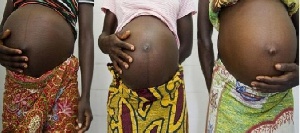Only 36 percent of pregnant women in the Northern Region patronise health facilities for delivery, Ms Georgina Amidu, Communications for Development Officer at United Nations’ Children’s Fund (UNICEF) said on Tuesday.
Ms Amidu indicated that the percentage was the lowest in the country and stressed the need for a second look to reverse the situation since it affected maternal and infant health care in the area.
Speaking at an advocacy dialogue with traditional leaders in the region for the elimination of harmful social and cultural practices, Ms Amidu said research showed that quality education, improved sanitation, nutrition, maternal and child health, and access to water supply also recorded low rates.
She noted that the inability to record high percentages in these indicators served as a serious threat to the development of the region.
Ms Amidu said that 39 per cent of girls in the region got married before the age of 18, and as a result of the early child marriage, 17 per cent of the children did not live with their biological parents.
This she explained was because; some parents perceived that better care for the children was offered at foster homes or homes of relatives rather than the young parents themselves.
The Yagbonwura Jakpa Sulemana Tutumba Boresa, President of the Northern Region House of Chiefs in speech read on his behalf said, Female Genital Mutilation (FGM), Early Child Marriages, certain aspects of widowhood rites and witch camps were very key areas of socio-cultural practices that needed to be addressed urgently.
He said these practices infringed on the rights of victims and expressed the worry that perpetrators go unpunished, adding, “The initiative of UNICEF to involve traditional rulers to combat such practices is warmly welcomed since we are the custodians of the respective jurisdictions”.
He urged other traditional leaders to see negative cultural practices as a threat to humanity and contribute their quota towards eradicating them to bring development to their communities.
Mr Salifu Saeed, the Northern Regional Minister said the adoption of positive behaviours that could improve the lives of children, women and the society had been too slow as a result of deep rooted social and cultural norms.
He said the establishment of the Northern Development Authority by the current government would look into the issues raised as well as others that affected the development of the people of the region.
Mr Saeed expressed gratitude to UNICEF and other development partners for partnering with government at various levels to bring development in the country.
Regional News of Wednesday, 19 July 2017
Source: GNA

















